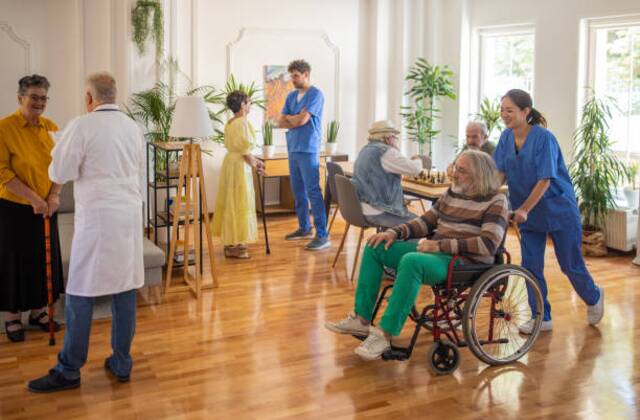Among the life choices that a family would make about an elderly loved one, the choice of the right nursing home is paramount. From the options available, finding just the right facility that may offer essential medical treatment with special concern for safety and compassion is important.

Essential Elements of a Safe and Caring Nursing Home
A good nursing home provides so much more than medical care: it provides a homelike environment where residents are safe, respected, and well cared for. When researching and comparing nursing homes, a few key qualities to keep in mind include the following:
Qualified and Caring Staff
Each member should be well trained, sensitive, and able to deal with the emotional and physical demands required when caring for elderly residents.
Pay attention to the interaction of the staff with the residents when you visit. Are they engaging yet patient? Do they fill the needs and answer questions of the residents? A caring and attentive staff can make all the difference in your loved one’s experience.
Cleanliness and Hygiene
Look around to check that common areas, dining rooms, and resident rooms are clean and free of mess. Unpleasant odors, dirty floors, or poorly maintained bathrooms would create red flags for you that something is seriously wrong here.
Check if there are policies related to infection control and hygiene within the facility, especially in the context of diseases like COVID-19.
Personalized Care Plans
Every resident in a nursing home has their personal needs for health and care. A good nursing home will develop an individualized senior care plan tailored to your loved one’s specific medical, emotional, and physical needs.
Activities and Social Involvement
Social contact and activities are important to the mental and emotional stability of patients, especially seniors. Good nursing homes should provide trips and other forms of recreational activities that are appealing to their residents and within their capabilities. These activities may involve exercise classes, arts and crafts, music therapy, and group outings.
Knowing this, you can use a lively and engaging social atmosphere as an aid in helping your residents to consider where they are living more like home and avoid feelings of isolation and depression.
Safety and Accessibility
The nursing home should ensure the safety and security of its residents. Observe whether the entrance is secure, with handrails and ramps. Ensure that emergency procedures like fire evacuation plans are established and well-known, along with medical response systems for its staff.
Other critical concerns involve accessibility, especially for residents who get around using a wheelchair or walker. The facility should be easy to navigate, with wide hallways and elevators installed where necessary.
Red Flags: Things to Watch for in Nursing Homes
Unfortunately, too many nursing homes fail to achieve the minimum standards necessary to protect and ensure their residents’ safety and well-being. There are signs family members can look for that may indicate neglect or abuse. Following is a list of common red flags:
Unexplained Injuries
Bruises, cuts, fractures, or falling frequently may indicate poor supervision or even physical abuse. When staff cannot come up with a reasonable explanation of how such injuries occurred, that is a cue that an investigation may be warranted.
Sudden Weight Loss or Dehydration
Changes in weight and the signs of dehydration may indirectly indicate whether or not a resident is getting enough nutrition, which may be associated with the care provided. Malnutrition and dehydration pose serious problems that could lead to other health complications.
Poor Personal Hygiene
If you find that your loved one is not being bathed regularly, or has dirty clothing, or other signs of poor hygiene, it can show that the facility is understaffed or neglectful. The resident should always look clean.
Emotional Changes
Signs of emotional or psychological abuse may include withdrawal, depression, anxiety, agitation, or similar actions. Be aware when there is a quick change in mood or behavior in your loved one-particularly displaying fear around certain staff members or resisting going back into the facility after home visits.
Dirty or Unsafe Conditions
As explained earlier, cleanliness is indicative of good care. If the facility is grimy, disorganized, or dangerous, this may become an indication of a lack of management and concern for details.
What to Do If You Think Nursing Home Abuse or Neglect Occurred
Suppose you feel that your loved one is being abused or neglected while in a nursing home. Immediate action must be taken. You will want to write down all of your concerns including any visible injury or neglect, and report these to the nursing home administration. You will also want to contact your local authorities or Adult Protective Services so that an investigation can be performed.
To learn more about Nursing Home Abuse and Neglect and for legal help, contact a Nashville nursing home abuse lawyer.
Final Thoughts
It is very important to select the right nursing home to ensure a more meaningful quality of life for your loved one. Making sure the nursing facilities have qualified staff, cleanliness, safety, and personalized concern for their clients will help you ensure that your loved one will receive the appropriate needed care. Most importantly, though, being vigilant in regard to the red flags themselves and knowing where to turn to for help makes all the difference in safeguarding the well-being of a family member.



